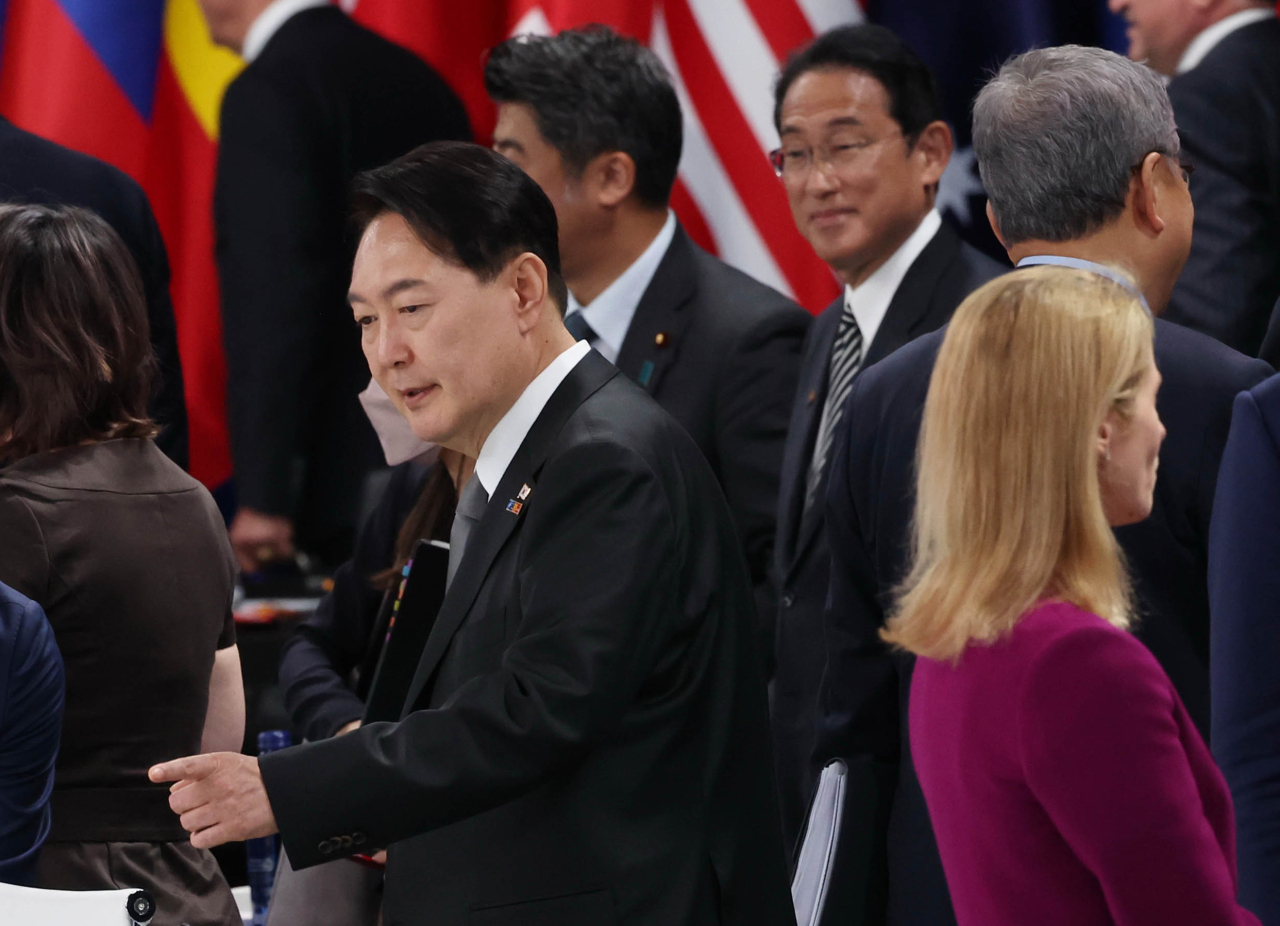 |
South Korean President Yoon Suk-yeol (left) and Japanese Prime Minister Fumio Kishida (back right) attend the NATO leaders’ summit in Madrid, Spain, Wednesday. (Yonhap) |
The South Korean government launched a consultative group on Monday to discuss ways to resolve the dispute with Japan over court rulings here that ordered Japanese companies to compensate victims of Japan’s wartime forced labor.
The Foreign Ministry’s First Vice Minister Cho Hyun-dong presided over the first meeting of the government-private consultative group, which involved dozens of government officials, Japan experts and the legal representatives of the forced labor victims and their families.
The dispute recently dates to 2018, when the Korean Supreme Court handed down separate rulings against Mitsubishi Heavy Industries and Nippon Steel, ordering them to provide compensation for the Koreans who had been forced to work for them during Japan’s colonization of the Korean Peninsula from 1910-45.
The Japanese firms, however, have refused to comply with the ruling, reiterating their government’s position that all issues regarding reparation were settled through a 1965 agreement to revive diplomatic relations.
Victims took the issue to court again, and judges ordered the Japanese firms to liquidate their Korea-based assets and provide the compensation.
Assessing that it would seriously damage already strained ties with Japan if the asset liquidation were carried out as ordered, the Yoon Suk-yeol administration launched the consultative group to gather opinions from related parties, according to the Foreign Ministry.
While the previous Moon Jae-in administration had openly advocated for the victims of Japanese abuses, the Yoon administration, which was inaugurated in May, has made clear its intent to revive ties with Tokyo.
Possible solutions include a “subrogation payment,” in which the South Korean government pays the victims and then asks the Japanese companies for reimbursement later.
Among other options, Seoul could also create a fund to gather donations from South Korean and Japanese companies to pay the victims.
But these state-led plans are largely opposed by the victims, who see them as “means to exonerate the Japanese perpetrators.”
In a press conference before the first meeting of the government-private consultative group on Monday, the victim support organization and the victims’ legal representatives urged the government to help them directly negotiate with the liable Japanese firms.
“We have demanded the inflictor companies for negotiation since the Supreme Court’s ruling in 2018. But we did not get the chance even to talk, let alone start a negotiation,” the legal representatives said.
Explaining that the forced labor issue is between the victims and the companies, the attorneys said it is “only natural for us to directly discuss about the issue with the Japanese firms.”
“If diplomatic efforts (from the government) are made and a direct negotiation can take place between the victims and the firms, we will coordinate with the victims and discuss the execution (of the asset liquidation).”
The legal representative of the victims, Lim Jae-sung, had said the solutions would only be supported after the liable Japanese companies take part in the envisioned fund for compensation.
While both South Korea and Japan have been working to rekindle their soured ties in recent months, Tokyo has demanded Seoul bring a solution to the forced labor issue.
(
herim@heraldcorp.com)




![[Herald Interview] 'Trump will use tariffs as first line of defense for American manufacturing'](http://res.heraldm.com/phpwas/restmb_idxmake.php?idx=644&simg=/content/image/2024/11/26/20241126050017_0.jpg)

![[Health and care] Getting cancer young: Why cancer isn’t just an older person’s battle](http://res.heraldm.com/phpwas/restmb_idxmake.php?idx=644&simg=/content/image/2024/11/26/20241126050043_0.jpg)

